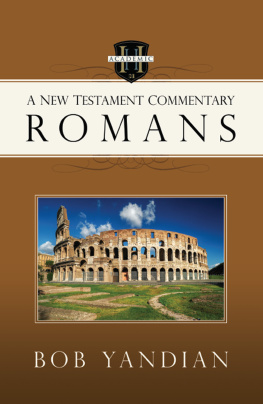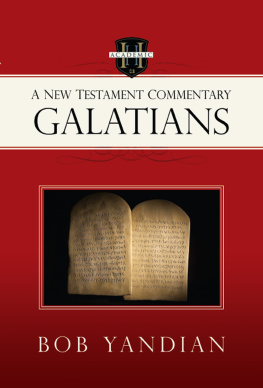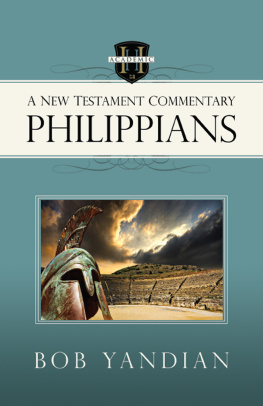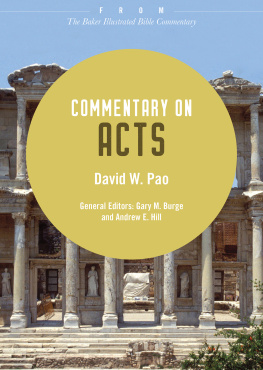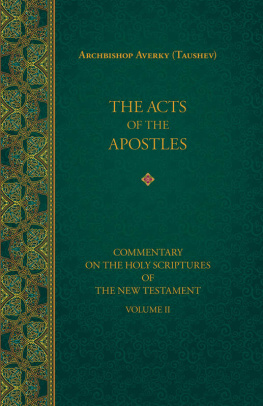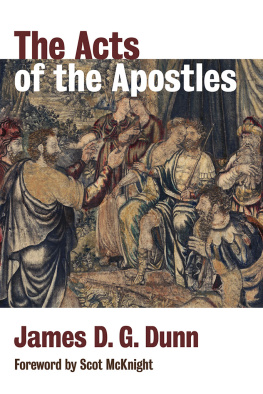Bob Yandian - Acts: A New Testament Commentary
Here you can read online Bob Yandian - Acts: A New Testament Commentary full text of the book (entire story) in english for free. Download pdf and epub, get meaning, cover and reviews about this ebook. genre: Religion. Description of the work, (preface) as well as reviews are available. Best literature library LitArk.com created for fans of good reading and offers a wide selection of genres:
Romance novel
Science fiction
Adventure
Detective
Science
History
Home and family
Prose
Art
Politics
Computer
Non-fiction
Religion
Business
Children
Humor
Choose a favorite category and find really read worthwhile books. Enjoy immersion in the world of imagination, feel the emotions of the characters or learn something new for yourself, make an fascinating discovery.
- Book:Acts: A New Testament Commentary
- Author:
- Genre:
- Rating:5 / 5
- Favourites:Add to favourites
- Your mark:
- 100
- 1
- 2
- 3
- 4
- 5
Acts: A New Testament Commentary: summary, description and annotation
We offer to read an annotation, description, summary or preface (depends on what the author of the book "Acts: A New Testament Commentary" wrote himself). If you haven't found the necessary information about the book — write in the comments, we will try to find it.
Acts: A New Testament Commentary — read online for free the complete book (whole text) full work
Below is the text of the book, divided by pages. System saving the place of the last page read, allows you to conveniently read the book "Acts: A New Testament Commentary" online for free, without having to search again every time where you left off. Put a bookmark, and you can go to the page where you finished reading at any time.
Font size:
Interval:
Bookmark:
ACTS
A New Testament Commentary
Bob Yandian
Convenient.

For the latest Harrison House product information and author news, look no further than your computer. All the details on our powerful, life-changing products are just a click away. New releases, email subscriptions, testimonies, monthly specials find them all in one place. Visit harrisonhouse.com today!
The Challenge of Chapter Twenty-Seven
As Paul travels to Rome and is about to be shipwrecked, Paul has a word from God: none would perish who stayed on board. His confidence and trust are in God, even as the storm rages on and circumstances are declining.
When the storms of life rage around you, and it looks like you are headed for shipwreck, where is your focus? Is your attention on the waves of circumstances that appear to be tearing your life apart, or are you looking to the people around you, being influenced by their reactions instead of being an influencer for the kingdom of God? We have Gods Word that ensures joy, peace, provision, divine health, and all the benefits of being a child of the King. His Word confirms the authority we have been given in Christ Jesus and through Him, our ability to overcome any storm that may come against us in life.
Chapter 27 is a description of the first part of Pauls trip to Rome, sailing from Caesarea to Malta.
Paul sails toward Rome by ship. The Romans were the worst sailors of the ancient world. They tried to take the land to sea and made ships as large as a football field, and the ships sank easily. Many of their ships sunk before they even sailed.
The Phoenicians, on the other hand, were the best sailors and were famous for their trade ships and routes in the ancient world. When the Romans went sailing or took over a ship, Roman law applied to the passengers while on board just as if they were on land. Roman ships had one mast in the middle of the ship. Phoenicians ships had many masts. This put all the stress on the middle of the hull and it was not uncommon for their ships to break apart at the center. Frapping became common by running ropes around the hull to help hold the ships together (undergirding [v. 17]).
Chapter 27 shows the impact of one man who knows and stands on the Word against the attacks of Satan. The entire crew will be saved through the faith of Paul.
Festus and the court decide to put Paul on a ship to Rome with other pris oners. The day after setting sail they land in Sidon, and Paul is permitted to visit the believers there. They then sail around the tip of Cyprus and come to Lycia. Paul and the other prisoners are then transferred to a ship sailing slowly to Italy, which would normally take many days. A fierce storm moves in and they sail to Crete where they remain for a time. Contrary to the thinking of the captain and owner of the ship, Paul warns them about sailing to Phoenix to remain for the winter.
27:1 And when it was decided that we should sail to Italy, they delivered Paul and some other prisoners to one named Julius, a centurion of the Augustan Regiment.
And when it was determined ( krino : judged, ordained) that we should sail into (toward) Italy, they delivered Paul and certain other prisoners unto one named Julius, a centurion of Augustus band (a famous Roman band).
Festus and the court decide to send Paul to Rome by ship in October, the worst time of the year for traveling by sea, But Festus had a reason for sending Paul at this time. This was not a regular sailing vessel, but an old ship that usually carried cargo along the coast. It was not designed for open-sea sailing. This is why they sailed along the coast for the first part of the trip to Crete (v. 13).
Julius was an officer Festus did not like. He planned to get rid of Paul and Julius in one move by sending them away in a worn-out ship at the worst time of the year. To Festus, the other prisoners and crew members were expendable. Festus does not intend for Paul, the letter he has written, Julius, or any of the crew to actually make it to Rome.
However, Festus does not take into account the will of God. Paul cannot be killed because he has a message to deliver and a ministry to fulfill. All the men will be saved because Paul is with them. This is blessing and protection by association (1 Corinthians 7:14).
27:2 So, entering a ship of Adramyttium, we put to sea, meaning to sail along the coasts of Asia. Aristarchus, a Macedonian of Thessalonica, was with us.
The we in this verse includes Luke and the rest of Pauls team. The ship will not make it to the Asian coast, but will be deserted in Myra (vv. 56). Aristarchus, who is accompanying Paul, is accustomed to danger (19:29, 20:4).
27:3 And the next day we landed at Sidon. And Julius treated Paul kindly and gave him liberty to go to his friends and receive care.
And the next day we touched at Sidon. And Julius courteously ( philanthropos : humanely) entreated Paul, and gave him liberty (freedom) to go unto his friends (21:35) to refresh himself.
This is a kind and gracious officer. He allows Paul to disembark from the ship to visit with believers in Sidon.
27:4 When we had put to sea from there, we sailed under the shelter of Cyprus, because the winds were contrary.
There was no other direction the ship could sail. It would have been less distance to sail to the western side of Cyprus, but the winds forced this sailing ship along the eastern side of Cyprus.
27:5 And when we had sailed over the sea which is off Cilicia and Pamphylia, we came to Myra, a city of Lycia.
Paul sees his home for the last time.
27:6 There the centurion found an Alexandrian ship sailing to Italy, and he put us on board.
This ship is also blown off course by the northwest winds into Myra. It was headed toward Crete (port of Fair Havens) and onto Puteoli, filled with grain from Egypt (v. 38). This ship would hold 276 people (v. 37).
27:7 When we had sailed slowly many days, and arrived with difficulty off Cnidus, the wind not permitting us to proceed, we sailed under the shelter of Crete off Salmone.
And when we had sailed slowly many days, and scarce were come over against Cnidus (ka-ni-tus), the wind not suffering (allowing) us, we sailed under (around the tip of) Crete, over against (around) Salmone;
After ditching the other ship, this one is more secure but is being slowed down by one of the worst sea storms in history. They are headed into the wind and are now in the last safe port before entering open sea to Crete.
27:8 Passing it with difficulty, we came to a place called Fair Havens, near the city of Lasea.
After passing Salmone, they are protected from the harsh winds.
27:9 Now when much time had been spent, and sailing was now dangerous because the Fast was already over, Paul advised them,
Now when much time was spent (had elapsed), and when sailing was not dangerous, because the fast was now already past (Atonement [October 10]; Leviticus 23:27, Numbers 29:7), Paul admonished (warned) them,
From October until March, ships usually remain in their home harbor because the weather is too unpredictable. Paul will advise them not to sail, but remain in Crete for the winter. He will sense in his spirit the extreme danger of the voyage to the ship, its cargo, and the passengers.
27:10 saying, Men, I perceive that this voyage will end with disaster and much loss, not only of the cargo and ship, but also our lives.
Paul waits for his spirit to bear witness because of the natural danger of this time of year. He perceives that the danger will be too great. Some believers would want to go on in faith and trust God. If something is not directly told you in Gods Word, you can only act in faith on what your spirit perceives by the direction of the Holy Spirit. In this case, the Holy Spirit is telling Paul not to go. The crew is tired of Lasea and wants to go on to Rome where times are more exciting. Paul will be overruled by the captain and majority opinion. The will of the majority is not always correct.
Next pageFont size:
Interval:
Bookmark:
Similar books «Acts: A New Testament Commentary»
Look at similar books to Acts: A New Testament Commentary. We have selected literature similar in name and meaning in the hope of providing readers with more options to find new, interesting, not yet read works.
Discussion, reviews of the book Acts: A New Testament Commentary and just readers' own opinions. Leave your comments, write what you think about the work, its meaning or the main characters. Specify what exactly you liked and what you didn't like, and why you think so.


